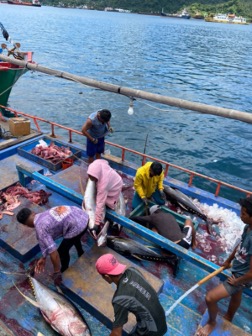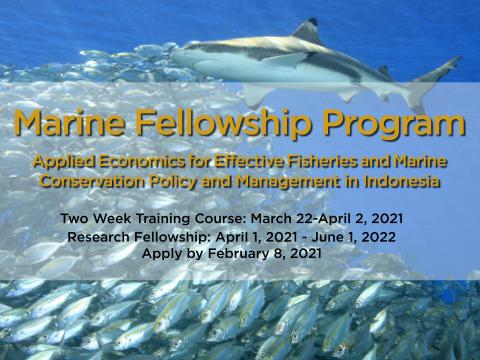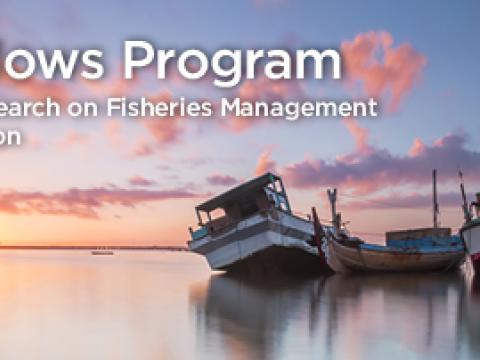Story From the Field: Unpacking The Challenges of Seafood Certification in Bitung and Buru Island, Maluku, Indonesia
Sustainable fishing practices are a growing global concern, the impacts of which affect all marine life across the globe and fishing industries. As an archipelago, Indonesia has an incredible potential to be a leader in sustainable fishing practices, with enough marine life to provide the country with an abundance of seafood, however, though blessed with the coral triangle and its marine biodiversity, Indonesia fishery practices are still far from sustainable.
One way to manage fishery sustainability practices is through a seafood certification program. Programs are being put in place across Indonesia, but how effective are they in managing fishing practices?
One of our Marine Fellowship Program (MFP) fellows, Cindy Silvia Hadi, a fishery and aquaculture auditor at the Control Union Indonesia is conducting research on the impact analysis of seafood certification in Bitung, North Sulawesi, and Buru Island, Maluku. Her research aims to catalog and assess whether the seafood certification program has resulted in positive outcomes for both the fishermen's society and the local economy. This research will help to build a strategic framework for future analyses of the social and economic impact of seafood certification on fishermen’s society.
Since June 2021, throughout the Covid-19 pandemic, Cindy and her team conducted random data sampling based on certification status and the size of the vessels. In total, there are a total of 80 samples vessels in her research. Cindy collaborated with the Indonesian Pole & Line and Handline Fisheries Association (AP2HI) as well as with the Masyarakat dan Perikanan Indonesia (MDPI).

In her research, Cindy finds that there is limited use of seafood certification in Indonesia, unlike other developed countries that have widely adopted this certification such as the United States and the European Union. Certification product provides opportunities for fishermen to have added value compared to non-certified products. Certified Fishermen get awareness training and assistance to implement sustainable fisheries as an indirect benefit and behavior change from MDPI and AP2HI. Nevertheless, our field observation suggests it may not greatly increase the direct income of fishermen due to a relatively long supply chain of tuna products. In addition, many fishermen also face difficulty accessing a productive loan from the banks due to their limited Financial Literacy. Hence, in several cases, they will rely on middlemen who act as loan sharks. A comprehensive policy is needed to increase the overall welfare of fishermen who participate in the certification scheme.
Additionally, there is still a lack of support from the local government in terms of seafood certification, as Cindy’s team found in Bitung and Pulau Buru. This certification is being initiated by NGOs and associations. The local government is involved in fish monitoring based on the fish catch in Bitung. The impact of seafood certification is mostly on the environment particularly to address overfishing. And so a question still remains as to whether the certification will have an impact on consumer demand.

The greatest challenge to her research is the time it takes to coordinate with the many stakeholders involved in this industry. As she is working with fishermen, private companies, middlemen, as well as the government, it takes longer to manage the bureaucracy. Furthermore, there is also a concern from some parties about the results of this research that may threaten the exposure of their confidential data. Nevertheless, negotiation has been made between Cindy’s team of researchers and the many stakeholders to ensure that no disruption may affect the process of certification.
Another challenge is that the questionnaire survey was delayed due to the pandemic which had an impact on the fishermen’s income. Besides, the questionnaire needs to be fixed by the agreement of both AP2HI and MDPI. However, this questionnaire survey will continue to be conducted this year assuming that the pandemic is over so that conclusions can be drawn based on the normal situation.
In 2022, Cindy will disseminate her research to the local fishermen, private companies, stakeholders, local governments, and universities of the Bitung and Buru Islands of Maluku. Through her research, Cindy believes that Bitung and Buru Islands fisheries could be managed sustainably with the collaboration and commitment of every stakeholder. As seafood certification is one of the solutions towards sustainable fisheries, these improvements could have a serious impact on the preservation of marine life across the country, however, it can not be implemented easily without cooperation between stakeholders.

- Log in to post comments


